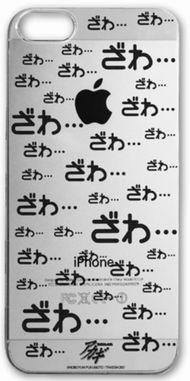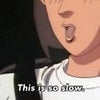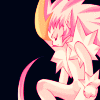| View previous topic :: View next topic |
| Author |
Message |
|
|
|
Lord Geo
Joined: 18 Sep 2005
Posts: 2783
Location: North Brunswick, New Jersey
|
 Posted: Fri Mar 08, 2019 2:06 pm Posted: Fri Mar 08, 2019 2:06 pm
|
 |
|
Along with Araki, Nobuyuki Fukumoto is iconic for his use of sound effect katakana, especially his "Zawa...Zawa..." for dangerous moments. It's become so iconic that there are literally swag & products based solely around the sound effect itself!

Before either of them, though, there was also Masami Kurumada, whose use of sound effects likely was an inspiration for many others, like Araki. He especially liked adding effects on top of the effects, like having the "BAKOOOOOOM" from Ring ni Kakero be cracked & damaged, as if the Galactica Magnum itself had impacted it.

I'm also a big fan of the Jet Upper from RnK, which simply uses the word "JET" for it's sound effect. It's such an iconic a part of the move that the "JET" was even kept on screen for the anime adaptation.

|
| Back to top |
|
|
|
I_Drive_DSM
 Joined: 11 Feb 2008
Joined: 11 Feb 2008
Posts: 217
|
 Posted: Fri Mar 08, 2019 4:07 pm Posted: Fri Mar 08, 2019 4:07 pm
|
 |
|
|
A little biased here but Initial D would be a very obvious choice for sfx in manga. Shuichi Shigeno's style for the sound effects are an obvious stylistic choice and often referenced and parodied.
The sound most often used in Initial D is ガア or 'ga' which more often appears like a variation of ガアアアアア = 'gaaaaa'. Close your eyes, say 'gaaaaaaaaaaa' progressively, and it sounds like a car accelerating if you were standing outside it.
|
| Back to top |
|
|
|
|
gsfirewall
Joined: 19 Jan 2009
Posts: 10
|
 Posted: Fri Mar 08, 2019 4:08 pm Posted: Fri Mar 08, 2019 4:08 pm
|
 |
|
| Lord Geo wrote: | Along with Araki, Nobuyuki Fukumoto is iconic for his use of sound effect katakana, especially his "Zawa...Zawa..." for dangerous moments. It's become so iconic that there are literally swag & products based solely around the sound effect itself!

|
came here to talk about this. it's actually so absurd that last year's anime (tonegawa) used this sound in an abusive way
|
| Back to top |
|
|
|
Top Gun
 Joined: 28 Sep 2007
Joined: 28 Sep 2007
Posts: 4911
|
 Posted: Fri Mar 08, 2019 5:00 pm Posted: Fri Mar 08, 2019 5:00 pm
|
 |
|
|
Nothing like a good MENACIIIIIIING
|
| Back to top |
|
|
|
Sakagami Tomoyo
 Joined: 06 Dec 2008
Joined: 06 Dec 2008
Posts: 956
Location: Melbourne, VIC, Australia
|
 Posted: Fri Mar 08, 2019 5:42 pm Posted: Fri Mar 08, 2019 5:42 pm
|
 |
|
My favourite would be "じーーーー" (jiiiii) for staring, sometimes actually vocalised in anime.
| The Article wrote: | | Some manga creators use sound effects as part of their art to dramatic effect – Hirohiko Araki's use of sound effects in Jojo's Bizarre Adventures are so distinctive, they're almost a character in the comics themselves. |
To the point where they're carried through into the anime. And we love it for it.
|
| Back to top |
|
|
|
R. Kasahara
 Joined: 19 Feb 2013
Joined: 19 Feb 2013
Posts: 725
|
 Posted: Fri Mar 08, 2019 7:49 pm Posted: Fri Mar 08, 2019 7:49 pm
|
 |
|
There was one sound effect I remember reading about in one of Frederik Schodt's books: "suron", which is the sound of milk being added to coffee. It's a passage I often think about when coming across an unusual sound effect in manga.
| Quote: | | In some extreme cases, some publishers leave the Japanese sound effect, translate what the Japanese characters say, and then give a translation of what it means. For example, (ニコニコ, with “niko niko” and “grin grin.” I personally think that's overkill / makes the panel look too busy, but maybe that's just me? |
I also think it's overkill, especially when it's a story where snappy pacing is important, like in some comedies. If the translation is done this way in the form of a glossary at the back, it's fine, but becomes a bit distracting when its on the same page as the actual sound effect.
|
| Back to top |
|
|
|
Wyvern
 Joined: 01 Sep 2004
Joined: 01 Sep 2004
Posts: 1641
|
 Posted: Fri Mar 08, 2019 8:13 pm Posted: Fri Mar 08, 2019 8:13 pm
|
 |
|
|
One thing I've noticed in American comics is that sound effects are becoming pretty rare. These days, most sounds are left for the reader to intuit, and aren't part of the artwork at all. If something explodes, you just see the explosion, there's no "BOOM" effect because it's assumed that the reader knows what sound an explosion makes.
That's a very different philosophy than manga, with its great tradition of "mood" effects. My favorite is the "DON!" sound in One Piece, which appears anytime an important new character is introduced, or a major plot development happens. It's become so famous that it even shows up in the anime (as the sound of a loud drum being hit twice in quick succession) even though the sound doesn't exist in-universe.
|
| Back to top |
|
|
|
Triltaison
 Joined: 03 Jul 2011
Joined: 03 Jul 2011
Posts: 838
|
 Posted: Fri Mar 08, 2019 10:33 pm Posted: Fri Mar 08, 2019 10:33 pm
|
 |
|
| Sakagami Tomoyo wrote: | | My favourite would be "じーーーー" (jiiiii) for staring, sometimes actually vocalised in anime. |
Mine too. Also a fan of "merumeru" for the poisonous email girl in Sayonara, Zetsubou-sensei, and the ubiquitous "hehe" lines radiating out from a character's head.
|
| Back to top |
|
|
|
Blackiris_
 Joined: 06 Sep 2013
Joined: 06 Sep 2013
Posts: 536
|
 Posted: Sat Mar 09, 2019 7:20 am Posted: Sat Mar 09, 2019 7:20 am
|
 |
|
|
These onomatopetic words are one of the hardest part about learning Japanese. As a foreigner, you just have a really hard time getting into them, even if your Japanese is pretty advanced. Sometimes these onomatopoeia are used to test if someone speaks native-like Japanese; it is said that if you understand newly made-up sound words you’ve never heard before, you have a really good grasp of the language. Ironically, not only manga, but also children’s books are usually full of these words, so many of them will be surprisingly challenging for Japanese learners, even when grammar and vocabulary are really basic. (Doesn’t help that sometimes the same sound word is to express a variety of totally different feelings.) I stayed at a Japanese friend’s family this weekend and read a picture book to his 2 year-old niece, and those sound words really made me stumble a couple of times. ^^
That being said, there are some useful rules that will help you get a better grasp of these words. But having a *really* good grasp of them will take a long, long time.
|
| Back to top |
|
|
|
|
OjaruFan2
Joined: 09 Jul 2018
Posts: 676
|
 Posted: Sat Mar 09, 2019 8:51 am Posted: Sat Mar 09, 2019 8:51 am
|
 |
|
| Quote: | | In some extreme cases, some publishers leave the Japanese sound effect, translate what the Japanese characters say, and then give a translation of what it means. |
What are some examples of manga series that does that?
|
| Back to top |
|
|
|
Sakagami Tomoyo
 Joined: 06 Dec 2008
Joined: 06 Dec 2008
Posts: 956
Location: Melbourne, VIC, Australia
|
 Posted: Sat Mar 09, 2019 7:56 pm Posted: Sat Mar 09, 2019 7:56 pm
|
 |
|
| Triltaison wrote: | | Also a fan of "merumeru" for the poisonous email girl in Sayonara, Zetsubou-sensei, and the ubiquitous "hehe" lines radiating out from a character's head. |
That reminds me, some parts of Sayonara Zetsubou-sensei (and a couple of other Shaft productions) have the main voice cast speak all of the sound effects. I imagine that confused the hell out of a lot of people.
|
| Back to top |
|
|
|
|
meruru
Joined: 16 Jun 2009
Posts: 476
|
 Posted: Mon Mar 11, 2019 3:12 pm Posted: Mon Mar 11, 2019 3:12 pm
|
 |
|
|
There's so many sound effects in manga because it's one of the idiosyncrasies of the Japanese language -- there's a lot of onomatopoeia, even for things that make no sound at all. Typical kid talk also uses a ton of onomatopoeia, and it's super useful for making manga action more clear.
|
| Back to top |
|
|
|
|



